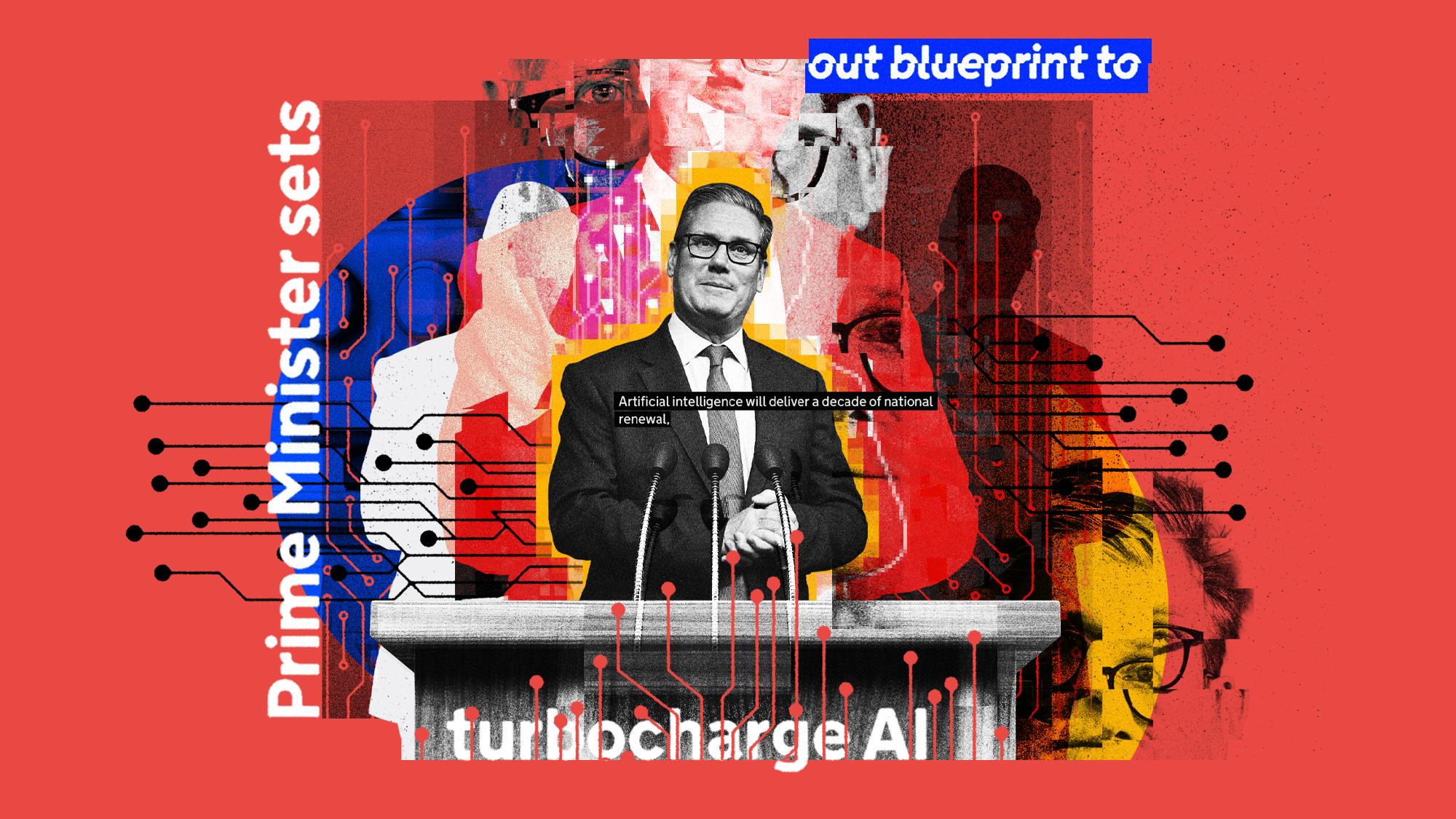How could AI-powered government change the UK?
Keir Starmer unveils new action plan to make Britain 'world leader' in artificial intelligence

A free daily email with the biggest news stories of the day – and the best features from TheWeek.com
You are now subscribed
Your newsletter sign-up was successful
The government aims to "mainline" artificial intelligence "into the veins" of the UK in new plans announced today.
Backed by leading tech firms, the multibillion-pound AI Opportunities Action Plan will see AI being used for everything from "spotting potholes to freeing up teachers to teach", said The Guardian.
Announcing the plan, Keir Starmer said AI would "drive incredible change" and could "transform the lives of working people". He added that he wanted Britain to be "the world leader" in AI. To achieve this, the government will implement all 50 recommendations made in tech entrepreneur Matt Clifford's review of artificial intelligence last year.
The Week
Escape your echo chamber. Get the facts behind the news, plus analysis from multiple perspectives.

Sign up for The Week's Free Newsletters
From our morning news briefing to a weekly Good News Newsletter, get the best of The Week delivered directly to your inbox.
From our morning news briefing to a weekly Good News Newsletter, get the best of The Week delivered directly to your inbox.
Among the plans are creating AI "growth zones", the first of which will be in Culham, Oxfordshire, and building a new supercomputer to increase UK computing power 20-fold by 2030. Public data, including anonymised patient records from the NHS, will also be made available to train AI models.
What did the commentators say?
A "slew" of technology bosses welcomed the announcement, said Sky News. Chris Lehane, chief global affairs officer at OpenAI, said the plan set the UK "on the right path", while Anthropic co-founder and chief executive Dario Amodei said the UK government could be "among the first and fastest" in the world to use AI to transform how it delivers public services.
Artificial intelligence could help solve the problem of low productivity that has long "bedevilled" the UK economy, said The Guardian. If AI helps workers produce more, that should increase wages and allow spare capital to be invested elsewhere.
However, the "flipside" is potential job losses. The Tony Blair Institute has suggested that 40% of public sector tasks could be automated and that between one and three million private-sector jobs could be lost. However, the government has claimed that, if "fully embraced", an AI revolution could create 13,000 private sector jobs and add £47 billion to the economy every year.
A free daily email with the biggest news stories of the day – and the best features from TheWeek.com
Speaking to Sky News’ Sunday Morning With Trevor Phillips, Science and Technology Secretary Peter Kyle acknowledged AI could cause some "disruption", but said it would "also create a lot new jobs". In addition, "used wisely", it would make the workplace "more efficient, effective and satisfying".
Plans to use NHS data have also raised concerns, with fears it could be "exploited for purposes beyond those intended", said The Times. Gaia Marcus, director of the Ada Lovelace Institute, told the government to "think carefully" about how the public would view the sharing of their health records, even in an anonymised format. Greater public engagement was needed, she said.
What next?
Plans to use public data will have to "jump hurdles" over privacy, ethics and data protection before they can be implemented, said The Guardian.
With the return of Donald Trump to the White House, US-based tech companies are also "closely watching" how AI will be regulated on either side of the Atlantic, said Politico. Trump is expected to once again take a light-touch approach, while the UK government's action plan includes a provision to "establish binding requirements" on tech firms.
Elizabeth Carr-Ellis is a freelance journalist and was previously the UK website's Production Editor. She has also held senior roles at The Scotsman, Sunday Herald and Hello!. As well as her writing, she is the creator and co-founder of the Pausitivity #KnowYourMenopause campaign and has appeared on national and international media discussing women's healthcare.
-
 How the FCC’s ‘equal time’ rule works
How the FCC’s ‘equal time’ rule worksIn the Spotlight The law is at the heart of the Colbert-CBS conflict
-
 What is the endgame in the DHS shutdown?
What is the endgame in the DHS shutdown?Today’s Big Question Democrats want to rein in ICE’s immigration crackdown
-
 ‘Poor time management isn’t just an inconvenience’
‘Poor time management isn’t just an inconvenience’Instant Opinion Opinion, comment and editorials of the day
-
 The Mandelson files: Labour Svengali’s parting gift to Starmer
The Mandelson files: Labour Svengali’s parting gift to StarmerThe Explainer Texts and emails about Mandelson’s appointment as US ambassador could fuel biggest political scandal ‘for a generation’
-
 Will Peter Mandelson and Andrew testify to US Congress?
Will Peter Mandelson and Andrew testify to US Congress?Today's Big Question Could political pressure overcome legal obstacles and force either man to give evidence over their relationship with Jeffrey Epstein?
-
 Reforming the House of Lords
Reforming the House of LordsThe Explainer Keir Starmer’s government regards reform of the House of Lords as ‘long overdue and essential’
-
 How long can Keir Starmer last as Labour leader?
How long can Keir Starmer last as Labour leader?Today's Big Question Pathway to a coup ‘still unclear’ even as potential challengers begin manoeuvring into position
-
 What is at stake for Starmer in China?
What is at stake for Starmer in China?Today’s Big Question The British PM will have to ‘play it tough’ to achieve ‘substantive’ outcomes, while China looks to draw Britain away from US influence
-
 ‘Human trafficking isn’t something that happens “somewhere else”’
‘Human trafficking isn’t something that happens “somewhere else”’Instant Opinion Opinion, comment and editorials of the day
-
 Can Starmer continue to walk the Trump tightrope?
Can Starmer continue to walk the Trump tightrope?Today's Big Question PM condemns US tariff threat but is less confrontational than some European allies
-
 Alaa Abd el-Fattah: should Egyptian dissident be stripped of UK citizenship?
Alaa Abd el-Fattah: should Egyptian dissident be stripped of UK citizenship?Today's Big Question Resurfaced social media posts appear to show the democracy activist calling for the killing of Zionists and police